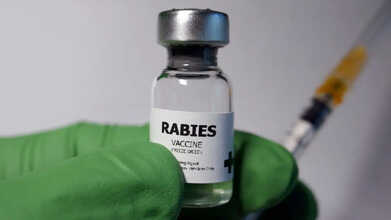- Health Conditions A-Z
- Health & Wellness
- Nutrition
- Fitness
- Health News
- Ayurveda
- Videos
- Medicine A-Z
- Parenting
What Happens If Bird Flu Becomes Airborne? Here’s How Long Infection Lasts

Image Credit: Health and me
A rapidly spreading strain of H5N1 avian influenza, more commonly referred to as bird flu, has ravaged bird populations worldwide. Since 2022, over 147 million birds in the U.S. alone have been affected, causing economic strain, increasing egg prices, and growing public health concerns. The virus has also begun spreading to other mammals, including dairy cows, cats, and even humans. The question of the day stands tall: what if bird flu mutated to turn airborne and effectively spread among people? Scientists warned that such mutation would be all it took for the next great global pandemic. Understanding Bird Flu: What makes it dangerous?
Bird flu is one of the forms of influenza which mainly infects birds but occasionally jumps to humans and other mammals. The high fatality rate among infected humans makes H5N1 more alarming. Similar to human flu viruses such as H1N1 and H3N2, H5N1 also has distinct protein structures that will not let it spread from one person to another, at least for now.
There are two major known subtypes of avian flu that have infected humans: influenza A(H5N1) and influenza A(H7N9). WHO reports that H5N1 mortality in the Western Pacific Region has reached up to 54% among reported cases. Despite the fact that human infections are rare, health experts are always worried about mutation.
Can Bird Flu Become Airborne?
Currently, H5N1 is not yet able to be transmitted from person to person by the air, although viruses are found to evolve. If H5N1's genetic makeup is changed in such a manner that it can be airborne, scientists fear that it may lead to a deadly pandemic. Unlike seasonal influenza, which spreads by respiratory droplets, bird flu is mainly transmitted by direct contact or any exposure to the infected animal or their body fluids. However, airborne transmission would mean the virus could spread much more easily, making containment significantly more difficult.
Researchers are keeping a close eye on cases in mammals, as transmission among non-bird species may be a sign that the virus is adapting. Pandemics such as the 1918 Spanish flu have, in the past, originated from animal influenza viruses that mutated to become highly transmissible in humans. If H5N1 takes this path, the world may be facing a severe public health crisis.
How Do Humans Get Infected with Bird Flu?
Although it is rare, bird flu can be transmitted to humans. Infected birds spread the virus through their saliva, mucus, and excrement. Other infected animals, like dairy cows, can also harbor the virus in their respiratory secretions, milk, or blood. In these cases, the virus is transferred to humans by direct contact with infected animals or surfaces. These viruses may enter the body through the eyes, nose, or mouth and can be inhaled via airborne particles, such as dust.
Although human infections have been few, the threat remains that each new case increases the possibility of mutation. The Centers for Disease Control and Prevention, U.S. emphasizes that the risk to the general population remains low, but cautions close contact workers who work closely with animals, like farmworkers and veterinarians.
Symptoms and Duration of Bird Flu Infection in Humans
The incubation period for H5N1 in humans varies but generally ranges between 2 to 5 days, with some cases taking up to 17 days to manifest symptoms. Common symptoms include:
- Fever
- Fatigue
- Cough
- Muscle aches
- Sore throat
- Nausea and vomiting
- Diarrhea
- Stuffy or runny nose
- Shortness of breath (dyspnea)
- Pink eye (conjunctivitis)
Most recent U.S. cases have been mildly symptomatic but, worldwide, H5N1 infections have caused severe respiratory illness and sometimes death. Mortality has been high in all previous outbreaks; thus, officials are on their toes in regard to new infections.
Who's at Greatest Risk?
The people at high risk of acquiring bird flu are those who are in close contact with infected animals, such as poultry farm workers, veterinarians, and dairy farmers. Also, people whose immune systems are weakened, including young children and older adults, are more susceptible to severe illness. Although this is rare, there have been documented cases of limited human-to-human transmission, especially among family members caring for infected individuals.
Are Eggs Safe To Eat?
Well, health experts have assured me that properly cooked poultry and eggs do not harbor the virus of avian bird flu. Also, high heat will kill such a virus for human consumption; however, sometimes birds get flu even after ingesting raw commercial pet food leading to the transfer of the diseases in under-cooked animal-based food products.
Raw milk from infected cows remains a potential risk, though more research is needed to determine the extent of its transmissibility. The CDC advises avoiding raw dairy products and ensuring that all poultry and eggs are thoroughly cooked before consumption.
Preventive Measures: How to Stay Safe
Although the current level of risk in humans is quite low, extra precautions are best taken, starting with people regularly in contact with birds or live stocks. Such precautions have included the following recommendation by the CDC:
- Avoid all direct contact with sick or dead birds and animals.
- Use adequate protective equipment- gloves, mask, goggles-as needed to collect potentially infected animals.
- Wash hands well afterwards with soap, water, antiseptic cleaners, and all poultry and its products.
- Poultry and eggs should be cooked to an internal temperature of 165°F/74°C.
- Pasteurized dairy products are the safest options.
Monitor for symptoms if you have been exposed to infected animals. Seek medical attention if flu-like symptoms occur.
The Uncertain Future of H5N1
Although the threat of an airborne mutation is speculative at this point, scientists warn against complacency. Surveillance programs monitor changes in the virus, and vaccine development is ongoing to prepare for a potential outbreak.
Like all other emerging infectious diseases, preparation is essential. Public health officers encourage further studies and collaboration that would ensure an early detection and control of H5N1 before it even threatens the entire world.
For now, the risk of a bird flu pandemic is low, but the experience with COVID-19 teaches that preparedness should be proactive. Understanding the risks, staying informed, and following recommended safety protocols can help to minimize potential dangers in the years ahead.
UK Under Amber Cold Health Alerts With Death Toll Expected To Rise

Credits: Canva
Amber cold health alerts have been announced for parts of northern England after forecasts warned that falling temperatures could lead to more deaths, particularly among older and vulnerable people. The UK Health Security Agency has issued two amber-level alerts for north-east and north-west England, which will be in effect from 8pm on Sunday until midday on Monday 5 January.
UK Under Amber Cold Health Alert: Elderly And Vulnerable People At Highest Risk
The agency said the expected cold spell is likely to increase pressure on healthcare services, with more vulnerable people needing medical attention. Officials warned this could lead to a rise in deaths, especially among those aged 65 and above and people with existing conditions such as heart disease, respiratory illnesses, and other long-term health problems.
UK Under Amber Cold Health Alert: UKHSA Gives Alert
UKHSA noted that risk is not limited to older adults. Younger people with health vulnerabilities and those sleeping rough are also likely to be affected as temperatures continue to fall.UK Under Amber Cold Health Alert: Concerns Over Indoor Temperatures
The agency warned that indoor temperatures in buildings such as hospitals, care homes, and clinics are expected to drop. Maintaining the recommended indoor temperature of 18C may be difficult, increasing health risks for patients and residents. While all other regions in England will be under a lower-level yellow alert, officials said there is still potential for added pressure on health services. Staffing shortages linked to travel disruption were also flagged, along with possible impacts on essential services such as transport and energy.
How Does Cold Weather Affect People In The UK
Cold weather in the UK can worsen existing health problems and create new risks, particularly during prolonged spells of low temperatures. It places extra strain on the heart and lungs, increases the likelihood of infections, and can make daily life harder for people who struggle to keep warm. Those living in poorly insulated homes or facing high heating costs are often hit the hardest.
The Met Office said much of England will remain cloudy overnight, with patches of frost and fog likely to develop. These conditions could lead to difficult and potentially hazardous travel on Monday morning.
Sub-zero Temperatures Forecast In Parts Of The UK
Overnight temperatures are expected to fall to around minus 1C in Penrith and hover close to freezing in parts of the Lake District where the amber alert is in place. In northern areas of Scotland, temperatures are forecast to drop further, reaching between minus 6C and minus 7C, as per Sky News.
A brisk northerly breeze is also expected along the north-east coast of England, making conditions feel colder and more uncomfortable. Dr Agostinho Sousa, head of extreme events and health protection at UKHSA, as per Sky News, urged people to look out for friends, family, and neighbours as the cold weather sets in.
“The temperatures we are expecting can have a serious impact on health,” he said. “They increase the risk of heart attacks, strokes, and chest infections, particularly among people over 65 and those with existing health conditions.”
Rabies Scare In Uttar Pradesh: Nearly 200 Villagers Get Vaccinated After Consuming Milk From Dog-Bitten Buffalo

Credits: Canva
Nearly 200 residents of Piprauli village in Uttar Pradesh’s Budaun district received anti-rabies injections as a precaution after learning that the raita, a curd-based dish served at a funeral, had been prepared using milk from a buffalo that later died following a dog bite.
Rabies Scare In Uttar Pradesh: Nearly 200 Villagers Get Vaccinated
Almost 200 people from Piprauli village in Uttar Pradesh’s Budaun district were given rabies vaccines as a safety measure days after consuming raita made from the milk of a buffalo that had been bitten by a dog. Villagers said the funeral ceremony took place on December 23, where raita was served to attendees. It later came to light that the buffalo whose milk was used had been attacked by a dog a few days before the event, as per NDTV.
The buffalo died on December 26, which led to panic in the village amid fears of possible infection. Soon after, villagers visited the Ujhani Community Health Centre, where they were administered rabies vaccinations.
Rabies Scare In UP: CMO Dr Rameshwar Mishra Clarifies Risk Of Transmission
Chief Medical Officer Dr Rameshwar Mishra said on Sunday that authorities were informed about a buffalo in the village that had been bitten by a suspected rabid dog and later died after showing symptoms associated with rabies.
There were reports that villagers had consumed what was believed to be “infected” raita. As a precaution, everyone who may have been exposed was advised to get vaccinated.
“Prevention is better than cure. Anyone who had even the slightest doubt was given the anti-rabies shot. Usually, there is no risk after milk has been boiled, but vaccination was done to eliminate any possible danger,” Dr Mishra said, as per NDTV. The health department confirmed that no cases of illness have been reported in the village so far and that the situation remains stable.
The CMO added that all those who came for vaccination were given the injection without delay at the Ujhani Community Health Centre. To ensure smooth access, primary and community health centres remained open on both Saturday and Sunday.
What Is Rabies Pre-Exposure Prophylaxis Vaccine?
Rabies pre-exposure prophylaxis, also known as PrEP, involves a series of injections taken before any potential exposure to the rabies virus, as per Cleveland Clinic. It is mainly advised for people at higher risk, including veterinarians, animal handlers, laboratory staff, and travellers visiting areas where rabies is common. While PrEP does not eliminate the need for treatment after a bite, it simplifies post-exposure care. Those who have received PrEP require fewer follow-up doses and do not need rabies immunoglobulin, which can be difficult to obtain during emergencies and can save valuable time.
How Can Rabies Pre Exposure Prophylaxis Vaccine Protect You?
According to Dr Deepa Aggarwal, MD, DNB, an allergy specialist with over 20 years of experience from LHMC and AIIMS Delhi, who shared insights on her Instagram account, the rabies pre-exposure prophylaxis vaccine helps prepare the immune system in advance.
It allows the body to build antibodies before any exposure occurs. If a vaccinated person is bitten later, they only need two booster shots and no immunoglobulin. This faster immune response reduces the chance of the virus reaching the brain, which is especially important for people at higher risk or in situations where medical care may be delayed.
Delhi Under Orange Alert for Cold Wave, AQI Remains 'Severe'; Here’s How It Could Affect Your Health

Credits: iStock
Today, Delhi again woke up to a thick layer of smog, and the adjoining cities like Noida, Ghaziabad, Gurugram, and Faridabad too woke up to zero-visibility fog on Monday. The air quality too dipped down to 'severe' category, with AQI registered at 400 plus on the index. While on Sunday, the AQI did show some improvement, as the city registered 'very poor' AQI, however, by the end of the day, the capital city was trapped under fog and pollution.
Delhi Struggling With Pollution And Cold Wave
The Indian Meteorological Department (IMD) has also issued an orange alert for Delhi on 29 December, Monday. The maximum temperature is expected to be around 22 degree Celsius, while the minimum will be at 7 degree Celsius. Mornings would encounter heavily dense fog, while there is an expectation of marginal relief on December 30. Most of North India is also said to be worst hit, including states like Uttar Pradesh, where thick fog is predicted till December 31, Punjab and Haryana is expected to face cold wave through December 30, and Himachal and Uttarakhand could see rain and snowfall from December 30 onwards.
As per IMD, cold wave is a condition of air temperature which becomes fatal to human body when exposed. This happens during the winter seasons and the cold wave impact gets aggravated due to wind speed. Cold Wave is considered when minimum temperature of a station drops to 10 degree Celsius or less for plains and 0 degree Celsius for Hilly regions.
How Can Cold Waves Impact Your Health?
IMD says that cold wave could cause mild to severe hypothermia. The common symptoms include shivering, dizziness, drowsiness, irritability, confusion, slowed, slurred speech, and altered vision. This happens when body experiences a lowered core temperature below 34.4 degree Celsius.
Frostbite is another health hazard that can happen due to cold waves. It is freezing of body tissue, accompanied with hypothermia. When ice crystal form between the cells of the skin and grow by extracting fluid from the cells, the circulation is obstructed, causing additional damage to the tissue affected. It commonly affects hands, feet, ears, nose and cheeks. The common symptoms are redness in skin, or skin turning grey. Some may also experience tingling sensations, fingers turning numb yellowish, waxy, or grey color.
Chilblains could be caused due to exposure to cold, wet, and humid conditions. Repeated prolonged exposure of bare skin could lead to this development in just few hours. It could impact your ears, nose, cheeks, fingers, and toes. Common symptoms include skin turning pale and colorless, prickly sensations, red, swollen, hot, and itchy skin and blisters.
Dehydration could also happen due to lack of fluid intakes, which is common during extreme cold. This could lead to headaches, dizziness, dry mouth, stomach cramps, and increased heartbeat. IMD notes carbon monoxide poisoning or CMP, snow blindness, and trench foot are also common during cold seasons, and provides ways to prevent these from happening.
What Do These Alerts Mean?
Delhi is currently under Orange Alert for cold wave. What do these different alerts mean?
Green Alert: This means no action will be taken, as this is a normal day during winter season
Yellow Alert: This means 'be updated' and refers to cold wave alert where the conditions in isolated areas may persist for two days
Orange Alert: This means 'be prepared' and refers to severe cold wave conditions that could persist for two days. This could also mean that though the condition is not severe, but the conditions could persist for four days or more
Red Alert: This means 'take action' and refers to severe cold wave conditions that persists for more than two days, or total number of cold wave days exceeding six days
© 2024 Bennett, Coleman & Company Limited

